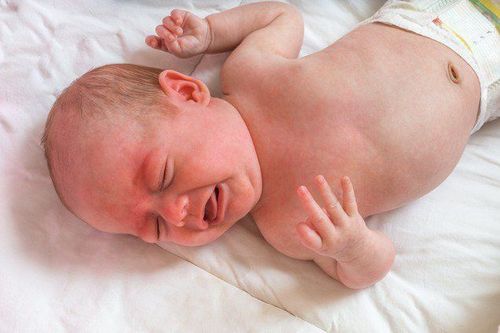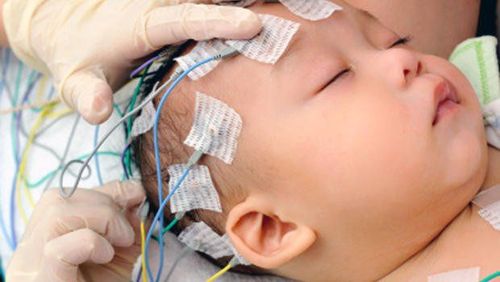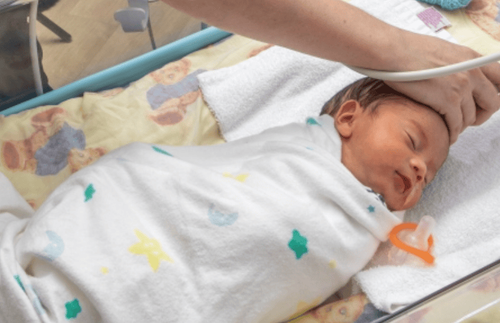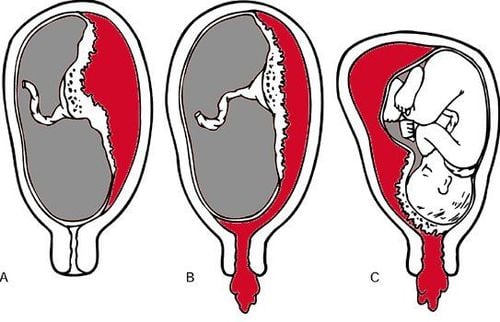This is an automatically translated article.
The article was professionally consulted by Doctor Nguyen Thai Ngoc Chau - Neonatologist - Pediatrics - Neonatology Department - Vinmec Phu Quoc International General HospitalNeonatal convulsive disorder often manifests in a variety of ways, but it is not too obvious and difficult to detect. Although the signs are small, in infants, seizure disorders can be caused by many medical conditions.
1. What are the symptoms of neonatal seizure disorder?
The signs of a newborn are usually relatively mild, if not paying attention will be very difficult to notice. The manifestations of convulsions in newborns are diverse, appearing continuously, such as:Abnormal movements in the muscles of the face, cheeks, lips. Abnormal movements in the face such as looking at one place, eye twitching... Disturbance of whole body movement, uncontrollable tremors of extremities. There are signs of muscle spasm, jaw. If not detected at the very beginning of the seizure , over time the symptoms will change more strongly such as :
Signs of shortness of breath , cyanosis of respiratory failure . Bulging fontanelles in infants. Signs of anemia. Paralysis of the cerebral nerves, the nerves that control the limbs. Fever. Head circumference changes, unusually large and small.

2. Causes of neonatal convulsive disorder?
Unlike older children, seizure disorders in infants often have a clear cause. Therefore, finding the cause of the disease is an extremely important step in treating the child. Causes of neonatal seizure disorders include:
Heredity: It is necessary to clearly determine whether there is a family member who has had it or not. Due to the mother's diet and lifestyle: If during pregnancy, the mother uses stimulants such as drugs, alcohol or too much coffee, it will also cause convulsions during childbirth. . Neonatal asphyxia : This is the most common cause of neonatal seizure disorder . Infant asphyxia before, during, or after birth can also lead to seizures. If this is the cause, the seizures are usually severe and difficult to treat, but will subside after about 3-4 days. Neonatal infections: In the case of neonatal infections such as meningitis or sepsis, convulsions can be caused. If this is the cause, the seizure will be accompanied by other symptoms and signs. Mother with diabetes: In some cases of mother with diabetes, the newborn is at risk of hypoglycemia, leading to asphyxiation and convulsions. Long-term hypoglycemia in newborns will affect the central nervous system, bringing unpredictable consequences. Newborns with polycythemia vera, hereditary hypercoagulability, or low blood pressure are more likely to lead to cerebral infarction or stroke. A stroke during a stroke is very dangerous for a child, because it can lead to sudden cessation of breathing.
3. Definitive diagnosis of neonatal seizure disorder
Doctors can partially predict the cause of an infant's convulsion based on the duration of the illness. Specifically:
If the baby has a seizure within 48 hours of birth, the main cause is asphyxia at birth, hypoglycemia, pyridoxine dependence, brain malformation,... In the first 3-7 days, there is a convulsion. Usually due to meningitis, hypocalcemia. After 7 days, it may be due to congenital metabolic disorders. After determining the duration of the convulsion, the doctor will examine the clinical symptoms, including:
Does the seizure appear in the whole body or only in a certain part? Light reflection of the pupil. Is there a pause in breathing? Does the child's fontanel show signs of bulging? Check skin color for signs of anemia. Find the site of the infection. There may be cases of tremor of the extremities, but it is benign. The basic distinguishing feature is that the tremor is faster than the convulsion and does not affect the eyes. This tremor usually occurs when stimulated from outside and can stop when adults gently restrain the child's limbs. Conversely, if the cause is other, the seizures will not stop while caring for the baby.
Tests to be done to determine the exact cause include:
If there are signs of meningitis, it is necessary to have a lumbar puncture. Ultrasonography of the fontanelle when suspected signs of cerebral or meningeal hemorrhage. Test Serum Glucose, electrolytes, blood, urine,... Measure blood oxygen saturation. For children with stable condition, CT and MRI can be performed. Once all other causes of injury have been ruled out, an EEG should be checked to determine the possibility of the child having an epileptic seizure. An electroencephalogram (EEG) can determine if an infant is having seizures as well as monitor during treatment. This method is most accurate even when the baby is asleep or awake, at least continuously for more than 2 hours. With an EEG with a monitoring time of more than 24 hours, it is possible to detect seizures without obvious symptoms, especially in the early stages of the child's central nervous system damage.

In summary, neonatal convulsive disorders often manifest in a variety of ways but are not so obvious, difficult to detect. Although the signs are small, in infants, seizure disorders can be caused by many pathological causes, seriously affecting the health of the child. Therefore, as soon as they notice the symptoms of convulsion in an infant, parents need to take the child to a reputable medical facility for examination, diagnosis and treatment.
Currently, the Pediatrics Department at Vinmec International General Hospital is trusted by many parents to examine the diseases that infants and young children are susceptible to. Vinmec brings satisfaction to customers and is highly appreciated by industry experts by:
Gathering a team of leading pediatricians: Including leading experts with high professional qualifications ( professor, associate professor, doctorate, master), experienced, worked at major hospitals such as Bach Mai, 108... The doctors are well-trained, professional, conscientious - understanding and understanding young psychology. Besides domestic pediatricians, the Department of Pediatrics also has the participation of foreign experts (Japan, Singapore, Australia, USA) who are always pioneers in applying the latest and most effective treatment regimens. . Comprehensive services: In the field of Pediatrics, Vinmec provides a series of continuous medical examination and treatment services from Newborn to Pediatric and Vaccine,... according to international standards to help parents take care of their baby's health from birth to childhood. Advanced techniques: Vinmec has successfully deployed many specialized techniques to make the treatment of difficult diseases in Pediatrics more effective: neurosurgery - skull surgery, stem cell transplantation blood in cancer treatment. Professional care: In addition to understanding children's psychology, Vinmec also pays special attention to the children's play space, helping them to play comfortably and get used to the hospital's environment, cooperate in treatment, improve the efficiency of medical treatment.
Please dial HOTLINE for more information or register for an appointment HERE. Download MyVinmec app to make appointments faster and to manage your bookings easily.














